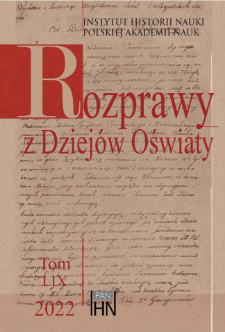- Wyszukaj w całym Repozytorium
- Piśmiennictwo i mapy
- Archeologia
- Baza Młynów
- Nauki przyrodnicze
Wyszukiwanie zaawansowane
Wyszukiwanie zaawansowane
Wyszukiwanie zaawansowane
Wyszukiwanie zaawansowane
Wyszukiwanie zaawansowane

Obiekt
Tytuł: Osnovnye napravleniâ blagotvoritelʹnoj deâtelʹnosti dinastii saharozavodčikov Haritonenko (vtoraâ polovina XIX – načalo XX veka)
Inny tytuł:
Wydawca:
Instytut Historii Nauki im. Ludwika i Aleksandra Birkenmajerów Polskiej Akademii Nauk
Miejsce wydania:
Data publ. on-line:
Typ obiektu:
Abstrakt:
Charity is a special type of activity, a form of socially responsible behaviour, social creativity, in which state and social interests, state regulation and personal impulse (noble or selfish, depending on the goals set) intertwine and interpenetrate. Private charity at the end of 19th and beginning of 20th century acquired a mass character. The initiative has shifted from a few aristocratic families to a rather broad mass of merchants, manufacturers and small landowners. Noble and useful causes very often proved profitable for business development. It was this combination that underpinned the large-scale philanthropy of the entrepreneurs. For the Kharitonenko family, religion, medicine, education and the arts were the main areas of such activities. They also financed the construction of city facilities and helped expand the city’s infrastructure. So we see that coming from a peasant environment, thanks to hard work, the Kharitonenko family made a difficult move up the class ladder. They made charitable activity a peculiar factor in their business and cultural development strategy. It was impossible to gain economic privileges, public recognition of merits, awards and titles without the glory of a patron of arts and a benefactor. Economic success was closely linked to large monetary outlays on the charitable cause.
Czasopismo/Seria/cykl:
Tom:
Strona pocz.:
Strona końc.:
Szczegółowy typ zasobu:
Format:
Identyfikator zasobu:
0080-4754 ; oai:rcin.org.pl:243394
Język:
Język streszczenia:
Prawa:
Licencja Creative Commons Uznanie autorstwa-Użycie niekomercyjne-Bez utworów zależnych 4.0
Zasady wykorzystania:
Właściciel praw autorskich:
Instytut Historii Nauki im. Ludwika i Aleksandra Birkenmajerów PAN
Lokalizacja oryginału:
Biblioteka Instytutu Historii Nauki PAN
Dostęp:
Kolekcje, do których przypisany jest obiekt:
- Repozytorium Cyfrowe Instytutów Naukowych > Piśmiennictwo > Czasopisma/Artykuły
- Repozytorium Cyfrowe Instytutów Naukowych > Kolekcje Partnerów > Instytut Historii Nauki im. Ludwika i Aleksandra Birkenmajerów PAN > Biblioteka IHN PAN > Czasopisma
Data ostatniej modyfikacji:
10 sty 2025
Data dodania obiektu:
9 sty 2025
Liczba pobrań / odtworzeń:
0
Wszystkie dostępne wersje tego obiektu:
https://rcin.org.pl./publication/280471
Wyświetl opis w formacie RDF:
Wyświetl opis w formacie RDFa:
Wyświetl opis w formacie OAI-PMH:
Obiekty Podobne
Kochan, Anna
Kulawiak, Anita Rachwał, Tomasz
Michałowska-Mycielska, Anna
Pullat, Raimo Liibek, Tõnis
Bogucka, Maria (1929–2020)

 INSTYTUT ARCHEOLOGII I ETNOLOGII POLSKIEJ AKADEMII NAUK
INSTYTUT ARCHEOLOGII I ETNOLOGII POLSKIEJ AKADEMII NAUK
 INSTYTUT BADAŃ LITERACKICH POLSKIEJ AKADEMII NAUK
INSTYTUT BADAŃ LITERACKICH POLSKIEJ AKADEMII NAUK
 INSTYTUT BADAWCZY LEŚNICTWA
INSTYTUT BADAWCZY LEŚNICTWA
 INSTYTUT BIOLOGII DOŚWIADCZALNEJ IM. MARCELEGO NENCKIEGO POLSKIEJ AKADEMII NAUK
INSTYTUT BIOLOGII DOŚWIADCZALNEJ IM. MARCELEGO NENCKIEGO POLSKIEJ AKADEMII NAUK
 INSTYTUT BIOLOGII SSAKÓW POLSKIEJ AKADEMII NAUK
INSTYTUT BIOLOGII SSAKÓW POLSKIEJ AKADEMII NAUK
 INSTYTUT CHEMII FIZYCZNEJ PAN
INSTYTUT CHEMII FIZYCZNEJ PAN
 INSTYTUT CHEMII ORGANICZNEJ PAN
INSTYTUT CHEMII ORGANICZNEJ PAN
 INSTYTUT FILOZOFII I SOCJOLOGII PAN
INSTYTUT FILOZOFII I SOCJOLOGII PAN
 INSTYTUT GEOGRAFII I PRZESTRZENNEGO ZAGOSPODAROWANIA PAN
INSTYTUT GEOGRAFII I PRZESTRZENNEGO ZAGOSPODAROWANIA PAN
 INSTYTUT HISTORII im. TADEUSZA MANTEUFFLA POLSKIEJ AKADEMII NAUK
INSTYTUT HISTORII im. TADEUSZA MANTEUFFLA POLSKIEJ AKADEMII NAUK
 INSTYTUT JĘZYKA POLSKIEGO POLSKIEJ AKADEMII NAUK
INSTYTUT JĘZYKA POLSKIEGO POLSKIEJ AKADEMII NAUK
 INSTYTUT MATEMATYCZNY PAN
INSTYTUT MATEMATYCZNY PAN
 INSTYTUT MEDYCYNY DOŚWIADCZALNEJ I KLINICZNEJ IM.MIROSŁAWA MOSSAKOWSKIEGO POLSKIEJ AKADEMII NAUK
INSTYTUT MEDYCYNY DOŚWIADCZALNEJ I KLINICZNEJ IM.MIROSŁAWA MOSSAKOWSKIEGO POLSKIEJ AKADEMII NAUK
 INSTYTUT PODSTAWOWYCH PROBLEMÓW TECHNIKI PAN
INSTYTUT PODSTAWOWYCH PROBLEMÓW TECHNIKI PAN
 INSTYTUT SLAWISTYKI PAN
INSTYTUT SLAWISTYKI PAN
 SIEĆ BADAWCZA ŁUKASIEWICZ - INSTYTUT TECHNOLOGII MATERIAŁÓW ELEKTRONICZNYCH
SIEĆ BADAWCZA ŁUKASIEWICZ - INSTYTUT TECHNOLOGII MATERIAŁÓW ELEKTRONICZNYCH
 MUZEUM I INSTYTUT ZOOLOGII POLSKIEJ AKADEMII NAUK
MUZEUM I INSTYTUT ZOOLOGII POLSKIEJ AKADEMII NAUK
 INSTYTUT BADAŃ SYSTEMOWYCH PAN
INSTYTUT BADAŃ SYSTEMOWYCH PAN
 INSTYTUT BOTANIKI IM. WŁADYSŁAWA SZAFERA POLSKIEJ AKADEMII NAUK
INSTYTUT BOTANIKI IM. WŁADYSŁAWA SZAFERA POLSKIEJ AKADEMII NAUK


































